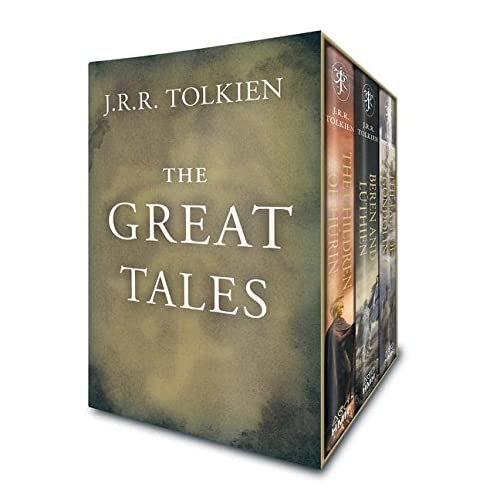Blogpost - The Tolkien Industry by Jack Ross
21 Jun, 2009
2009-6-21 7:36:15 AM UTC
2009-6-21 7:36:15 AM UTC
Interesting article on Tolkien editions, collecting and criticism.
"........
His most noticeable legacy, unfortunately, seems to be a ragtag and bobtail (to use a Tolkienian term) of mostly American scholars who specialise in ever more recondite and fatuous explorations of the implications of the papers and manuscripts which Tolkien himself sold them so long ago.
........"
http://books.scoop.co.nz/2009/06/16/the-tolkien-industry/
"........
His most noticeable legacy, unfortunately, seems to be a ragtag and bobtail (to use a Tolkienian term) of mostly American scholars who specialise in ever more recondite and fatuous explorations of the implications of the papers and manuscripts which Tolkien himself sold them so long ago.
........"
http://books.scoop.co.nz/2009/06/16/the-tolkien-industry/
I quite enjoyed reading that little article, and I think his points are all fairly sound. I must admit, I do despair when I see yet another book of Tolkien criticism show up on Amazon. I really think that everything worth saying has largely been said, and that examining anyone's life and works to the degree that seems to have been done for JRRT produces some fairly dull - and fundamentally rather pointless commentary (which often seems to say more about the author than anything else).
If half the effort was put into creating something new and original, rather than treading and re-treading paths that are worn very, very thin, the world would be a richer place, methinks.
I think he might be being a bit harsh on HoME, although I think perhaps 6 volumes would have been sufficient (with 3 dedicated to LoTR) to provide all of the information necessary for all but the most obsessed. It may be that I'm not really the target audience (and so I don't fully relate to it), or it may be that HoME just got a bit out of hand. Probably a bit of both.
I do think there is a danger in publishing every last word that Tolkien wrote, because some of it was undoubtedly rubbish that should have been left on the cutting-room floor, and I agree with author that we probably haven't seen the last of it...
If half the effort was put into creating something new and original, rather than treading and re-treading paths that are worn very, very thin, the world would be a richer place, methinks.
I think he might be being a bit harsh on HoME, although I think perhaps 6 volumes would have been sufficient (with 3 dedicated to LoTR) to provide all of the information necessary for all but the most obsessed. It may be that I'm not really the target audience (and so I don't fully relate to it), or it may be that HoME just got a bit out of hand. Probably a bit of both.
I do think there is a danger in publishing every last word that Tolkien wrote, because some of it was undoubtedly rubbish that should have been left on the cutting-room floor, and I agree with author that we probably haven't seen the last of it...
I must admit, I do despair when I see yet another book of Tolkien criticism show up on Amazon. I really think that everything worth saying has largely been said [...]
On the other hand, people are still writing Shakespeare criticism some four hundred years after his death, aren't they? Not to mention Chaucer, Gawain, and Beowulf criticism, all even longer in the tooth. While I would agree that there have been quite a few mediocre Tolkien studies published (especially as a result of the "Peter Jackson effect"), I do not agree that most everything worth saying has been said. Just my two cents, though, and I suppose I have a vested interest in seeing the scholarship continue. :)
On the other hand, people are still writing Shakespeare criticism some four hundred years after his death, aren't they? Not to mention Chaucer, Gawain, and Beowulf criticism, all even longer in the tooth. While I would agree that there have been quite a few mediocre Tolkien studies published (especially as a result of the "Peter Jackson effect"), I do not agree that most everything worth saying has been said. Just my two cents, though, and I suppose I have a vested interest in seeing the scholarship continue. :)
I wholly agree with Jason. In fact, my response to another book of Tolkien criticism showing up on Amazon is the complete opposite of Ross. I guess the only time I despair is when the book seems to me overpriced--which has happened more than once.
Ross does have some valid points in his article, though I do think he is a bit unfair in his evaluation of Rateliff's History of The Hobbit. Personally, I don't see how being overly detailed and overly long are valid criticisms. In fact, I tend to fall on the opposite side when it comes to criticism--I find books lacking that are not detailed enough or are too short. Also, many of these "criticisms" could also be made of LOTR, couldn't they?
"The History of the Hobbit is fun to read, mind you. I enjoyed it greatly. But it’s not as much fun as it should be. Because it’s 900 pages long. Because it’s immensely repetitive and overly detailed on points of no consequence. Because its author, John D. Rateliff, has no sense of proportion. Because its publishers know that anything with Tolkien’s name on the spine will sell in gazillions (take the recent reprint of parts of Unfinished tales under the stand-alone title of The Tale of the Children of Húrin, for instance). Rateliff, alas, is no Christopher Tolkien."
Ross does have some valid points in his article, though I do think he is a bit unfair in his evaluation of Rateliff's History of The Hobbit. Personally, I don't see how being overly detailed and overly long are valid criticisms. In fact, I tend to fall on the opposite side when it comes to criticism--I find books lacking that are not detailed enough or are too short. Also, many of these "criticisms" could also be made of LOTR, couldn't they?
"The History of the Hobbit is fun to read, mind you. I enjoyed it greatly. But it’s not as much fun as it should be. Because it’s 900 pages long. Because it’s immensely repetitive and overly detailed on points of no consequence. Because its author, John D. Rateliff, has no sense of proportion. Because its publishers know that anything with Tolkien’s name on the spine will sell in gazillions (take the recent reprint of parts of Unfinished tales under the stand-alone title of The Tale of the Children of Húrin, for instance). Rateliff, alas, is no Christopher Tolkien."
I wholly agree with Jason. In fact, my response to another book of Tolkien criticism showing up on Amazon is the complete opposite of Ross. I guess the only time I despair is when the book seems to me overpriced--which has happened more than once.
Or we could simply let Tolkien's wonderful works stand for themselves (!), rather than subjecting them (and him) to endless (and generally completely subjective) scrutiny. Don't get me wrong, I think that there are numerous analytical works that I think are fantastic (but I'm thinking of a very small number of Authors, such as Humphrey Carpenter, Hammond/ Scull etc). The vast majority of books on or about Tolkien are completely unnecessary and either re-hash existing material or promote the authors' own agendas ("The Gospel according to Tolkien" springs to mind). The reality is that Tolkien's legacy has become a trough with a lot of greedy snouts dipping in to get what they can (sometimes just reflected glory). The success of those authors with integrity (such as, but not limited to, those mentioned above) has spawned a whole industry.
On the other hand, people are still writing Shakespeare criticism some four hundred years after his death, aren't they? Not to mention Chaucer, Gawain, and Beowulf criticism, all even longer in the tooth.
Yes, they are. Any generation can - perhaps - usefully revisit older works and re-evaluate them in the current social context. This probably has some value, but most re-evaluations will simply be more of the same re-hashed. The biggest thing I learned from English Literature at School was that it told me more about the critics than the material being critiqued....















 3994
3994 1738097
1738097